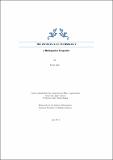| dc.description.abstract | The question concerning technology lies at the heart of human existence. As such it must take a central place in philosophy today. This importance, however, is veiled by a historical interpretation of technology as instrumental. This instrumentalism is the result of an ambiguity in the Aristotelian legacy that arises from an understanding of reality rooted in a theory of the categories, on the one hand, and a theory of causality on the other. This has left us with an ambiguous understanding of human making split by the twofold structure of artistic and representational thinking. The former is characteristic of empirical knowledge, the latter epistemological knowledge. This thesis follows Heidegger in arguing that an integral understanding of technology can only be achieved through a creative retrieval of Aristotle's ontology that interweaves the question of causality and the question of the categories, which we have outlined below as the interplay between potentiality and actuality, between being and non-being, and between truth and untruth. While indebted to Aristotle, this involves an important re-thinking of the nature of ontology, for it is made possible by exposing the limits of Aristotle’s theory of time, which understands time as a succession of present instants, and moving towards the Heideggerian understanding of presencing as the opening of a horizon in which things perdure. Consequently, this is an ontology in which technology is tied to our notion of time just as much as to our notion of being. After establishing this temporal ontology as the basis for an understanding of technology, in a unique way we apply it to the particular case of 3D printing and come to see that this technology is indeed more than an instrument; it is an interweaving of the epistemic and the poetic, the rational and the artistic. Thus I accept the consensus in contemporary philosophy of technology that questions of technology must be understood in terms of their political and social implications. However, unlike many thinkers in this field I also argue that they can be fruitfully understood in terms of a temporal ontology. | en_IE |


